Before couples get comfortable and settle down, they go through the 5 stages of a relationship during which they get to know each other and connect emotionally.
In a nutshell, the stages make them feel infatuated with each other, allow them to ask important relationship questions, and show them a preview of what life in union is going to look like. They help them see whether they’re compatible now and long-term and if they can grow their love for each other the way they need to.
Relationship stages serve an important role in new relationships because without them, couples can’t grow fond of each other and form strong emotional bonds that help them overcome difficulties. If they skip any of the stages mentioned in this article, they risk running into issues later down the line when they’re supposed to commit, plan the future, and make the relationship stronger.
The truth about relationship stages is that not everyone goes through them. Couples who are in a rebound relationship, for example, go through completely different stages. They go through rebound stages and more often than not, skip phases or fail to advance from one stage to the next.
Some couples also go through these stages quicker than others. How fast they move depends on their emotional availability, self-esteem, desire to settle down, ability to trust, problems in the relationship and outside of the relationship, and personality/gender/cultural/religious differences.
Everyone is going or has gone through different experiences in life, which means that everyone is different and responds differently. If someone loses a parent after meeting someone he or she likes, that person obviously won’t continue feeling elated. The painful event will most likely stop the elation and take a toll on the attraction that had been developed.
This is just one example of many things that can go wrong and disturb the natural flow of the development of a new relationship. Keep that in mind so you know that new couples can get affected by a myriad of things and that certain things such as rebounds and deaths in the family can increase the speed at which new relationships develop and that they can slow them down or kill them completely as well.
Now that we’ve made that clear, let’s talk about the 5 stages of a relationship couples go through when they’re ready for a relationship and don’t get affected by external factors.
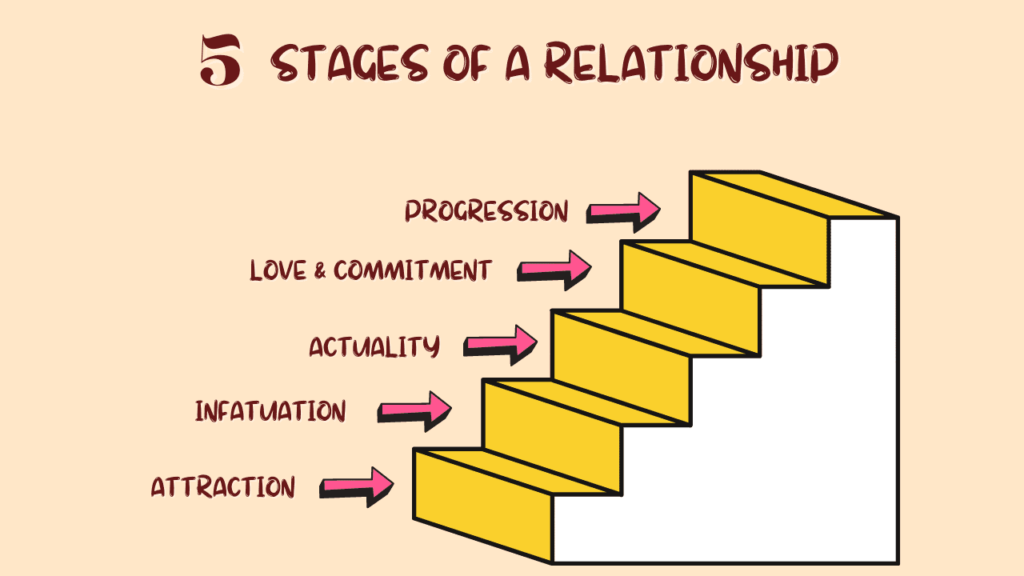

1)Attraction
The first stage of a relationship in dating is the attraction stage. This stage is very straightforward. It occurs when you find a person attractive and want him or her to feel the same.
Because you’re ready for a new relationship, you feel that you deserve commitment, respect, and love and that this is your chance to be happy and settle down with someone you think highly of.
You essentially believe that you’ve waited long enough for love, so you instantly fall in love with a person’s looks, personality traits, attitude, confidence, and resemblance to your parents.
Of course, you don’t actually fall in love because love occurs months later. You just become attracted to a person’s external traits and develop a crush – which is a bit of an infatuation and a desire for a person to reciprocate your feelings.
The reason why I say you become attracted to a person’s external traits is that you have no idea how this person acts or rather, reacts when he or she isn’t happy. All you know is how he or she behaves when things are going well and that you like the way you feel in his or her presence.
In this stage, hormones instruct you to obtain your crush’s validation and tell you to emotionally and physically connect with him or her. Receiving validation and connecting on a deep emotional level doesn’t only spice up your life but also boosts your self-worth and gives you a feeling of safety.
It tells you that the person you like values you/finds you attractive and that you can soon start working toward merging your lives and building something meaningful together.
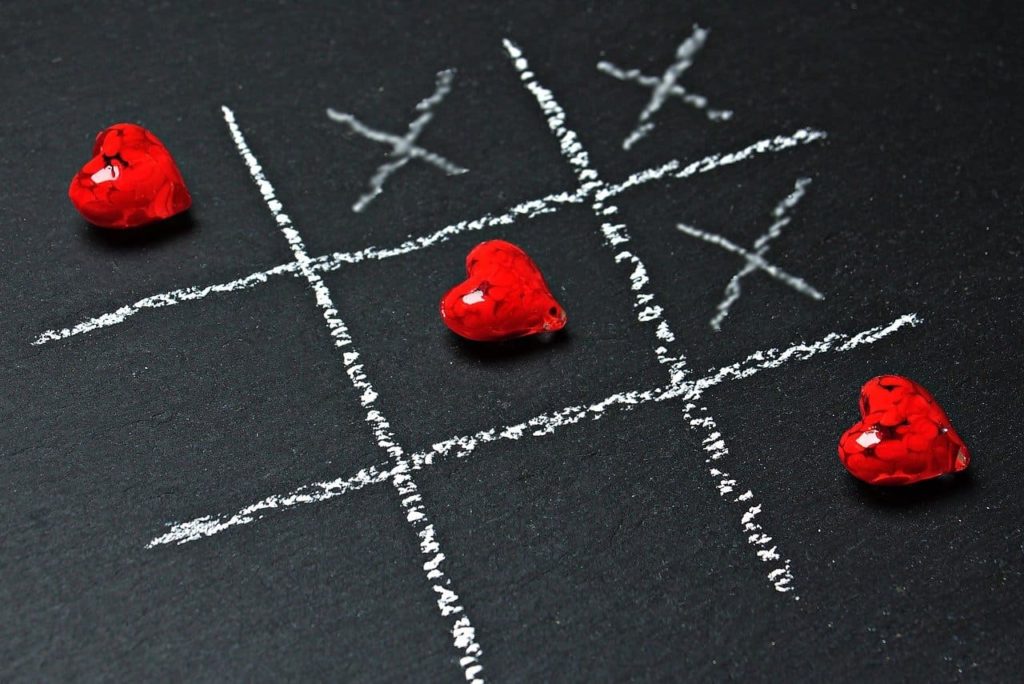

The attraction stage of a relationship is essentially a crush that is made of a desire to connect and be treasured. That’s why you want to spend a lot of time around the person you like and ask him or her questions.
Questions that look for common interests, values, goals, beliefs, and long-term compatibilities. The more you have in common with your crush, the stronger your feelings become and the closer you get.
When the person in question discovers that he or she also feels attracted to you, you’ll notice that his or her body language has changed. Suddenly, there’ll be a lot more touching, laughing, giggling, leaning forward, and nervousness. This is because a person who likes you will develop expectations of you.
He or she will want to make a good impression on you and develop a good connection with you. If the man or woman has a lot of dating experience and/or is confident, you may not notice much or any shyness. But you will nonetheless see that he or she wants to spend a lot of time with you and get to know you.
Some of the things you may notice are:
- an increase in texts, calls, invitations, and the time you spend together
- questions about your dating interests, past relationships, likes/dislikes
- a change in attitude, receptiveness
- compliments, teasing, and flirting
All you need to do at this point is let the attraction grow naturally. Don’t use push-pull techniques and play mind games. If your crush likes you, you just have to be yourself—and everything will work out the way it’s supposed to.
Keep in mind that the attraction stage usually begins from day 1 and lasts until the next stage.
2)Infatuation
The infatuation stage of a relationship is the stage that makes the biggest impression on couples. It makes couples feel so passionate about each other that they ignore the early warning signs of a bad relationship and focus on the way their relationship makes them feel.
They do this because the butterflies caused by mutual affection feel so good that they don’t want to think that something could be wrong with the relationship. They don’t want to feel doubtful, so they focus on the good stuff – on reasons why they’re meant for each other and why they deserve happiness in their lives.
Generally speaking, there’s nothing wrong with positive thinking. It’s important to appreciate the person you’re with because appreciation during the infatuation stage later develops into a strong emotional bond and commitment. It makes it possible for couples to develop the willpower to overcome disagreements, misunderstandings, and hardships.
The problem, though, is that some people only focus on the way their relationship makes them feel. They don’t care if their dating candidate is saying or doing something they don’t understand or agree with. They just tolerate their partner’s behavior for the sake of getting along and by doing so, fail to establish a healthy relationship basis early on.
Unfortunately, a relationship basis is very important because it sets strong rules. It tells couples what’s allowed and what needs to change. For example, if a guy in a relationship is talking to many women and his partner doesn’t like that, his girlfriend needs to express this right away.
She needs to set healthy boundaries from the beginning because the quicker she does that, the sooner the guy will see that she respects herself and that she won’t tolerate certain behavior. If a woman merely brushes things off and waits for the guy to get out of the infatuation phase and then discuss relationship standards, chances are that he won’t see things from her perspective and appease her needs.
He could refuse to change his negative patterns and even call her controlling.
That’s why people need to be smart in the infatuation phase. They need to be rational at times so they can pick up on unhealthy behavior and discuss it with their partner when their partner is the most open to compromise.
If a person doesn’t listen to you, empathize, and want to adjust, he or she is by definition closed-minded and immature, and won’t adjust later either. You want to be aware of that so you can break things off before you get taken for granted and so attached that you find it difficult to distance yourself.
Anyway, if you’re in the infatuation stage of a new relationship with someone you like, you likely have your rose-tinted glasses on and see only the good in your partner. You see the things your partner has shown you and told you and likely haven’t encountered any or many arguments and difficulties yet.
You’re both still on your best behavior and need more time to stop feeling infatuated with each other.
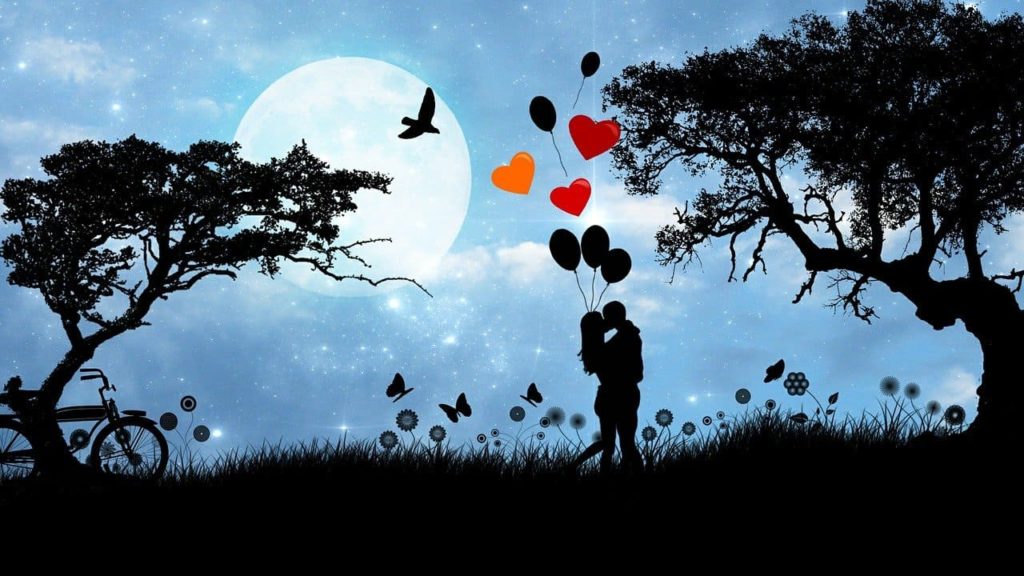

Some words that are typically associated with infatuation are:
- lust
- passion
- recklessness
- perfection
- unrealism
My advice is not to resist the feelings of mutual attraction. Embrace the feeling of falling in love, but also stay self-aware so you can detect any red flags and things that need to be discussed.
The infatuation phase, also known as the honeymoon stage starts when couples start kissing and sleeping together and lasts about 2-4 months. It’s the most powerful stage of a relationship and probably the most important one too. If you don’t handle it with confidence and rationality, you may later be disappointed with the boundaries you’ve set.
3)Actuality
4 – 6 months or so into the relationship (depending on how often couples see each other), couples finally get to know each other and take their rose-colored glasses off. They learn about some of each other’s bad habits and shortcomings and become forced to discuss them and work on them.
At this point, the relationship still feels new and rewarding, but no longer feels infatuated – highly emotional and flawless.
Now, couples are a lot more realistic and stop relying on emotions of attraction for the success of their relationship. They can no longer pretend that everything’s perfect, so they start showing their true colors. They reveal their relationship-solving skills and maturity and demonstrate how willing and capable they are of solving relationship challenges.
If their relationship mentality is healthy and they’re ready to maintain their romantic relationship, they do what they do best and let their actions speak for themselves. But if they’ve entered the relationship for selfish purposes or if they haven’t done the work on themselves prior to getting in a relationship, they tend to resist changes and blame each other for their flaws, mistakes, and the way they feel.
Such couples start bickering and giving each other a taste of what their relationship is going to look like from there onwards. When they fight, they experience a power struggle and may occasionally feel misunderstood, misheard, and doubtful about the relationship.
The actuality stage of a relationship is also quite important compared to other stages because couples become sensible. They see for themselves that their relationship is far from perfect and that they may need to make some healthy adjustments and improvements.
If they don’t meet each other halfway for the sake of the relationship, their relationship doesn’t improve and grow on its own over time. It stagnates and becomes at risk of breaking apart when unresolved issues overburden it.


To make the relationship stronger in the actuality phase, expressing gratitude is very important. It’s more important than in the other two phases because now, compliments, gratitude, and positivity actually matter.
Now that emotions of infatuation have waned, you need to communicate your thoughts and express your feelings. You need to show that the person you’re with is important to you and that you’re glad he or she is making an effort to grow with you.
If you’re a highly emotional person, it’s also important not to overwhelm your partner. Too much affection in this stage can come across as a red flag to some people because it can make them feel that you’re overprioritizing them and neglecting yourself.
So don’t make your life all about your partner. Make sure to have hobbies, friends, and a life outside of the relationship as well.
4)Love and commitment
If you make it to the fourth stage of a new relationship, love is finally going to start to develop. You’re not just going to feel comfortable and more secure in the relationship, but you’ll also know that your lives are heading in a similar direction.
What I mean by that is that you’ll notice you have the same goals and interests, that your personalities match, and that you’re emotionally and mentally capable of achieving your goals both as a couple as well as individually.
All you’ll need from the person you love is commitment. You’ll need to hear him or her say the three magic words so that you confirm that he or she has the same plans for the relationship as you. By officially agreeing to be in an exclusive relationship, you’ll agree to be faithful to each other and work through any issues you encounter on your path.
There’s no specific time by which couples should agree to be in a relationship because as we’ve mentioned, all couples go through relationship stages at a different pace. But if it’s been more than 6 months of dating and you haven’t agreed to be with each other yet, something’s probably odd.
Someone has trust issues, insecurities, fears of judgment/commitment, or some kind of difficulty expressing love and other similar emotions. In that case, the person wanting commitment may want to discuss this in a respectful, non-blaming manner so that the other person can feel safe to open up.
Oftentimes, people aren’t even aware of their issues. They think it’s normal to act the way they act and that others should be more understanding of their feelings and behavior.
That’s why you need to approach this topic gently so that you don’t make the other person want to defend himself or herself.
Always remember that love should be as selfless as possible. It’s hard not to expect much from your girlfriend or boyfriend, husband or wife, but nonetheless, try to be patient by expressing yourself in a sympathetic manner.


If you’re in love and have committed to your partner, you’re both emotionally compatible with each other. To stay compatible in other ways as well, you’ll have to master communication and accept each other’s differences. You’ll also have to think of arguments as mere disagreements and not as ultimate deal-breakers.
All couples disagree at times. It’s how they handle those disagreements that defines the success of their relationship.
In the love and commitment stage, couples’ happiness becomes dependent on their ability to maintain the relationship. The less they fixate on the bad things and the more they invest in themselves, the happier they are with each other and the less frustrated they are when they don’t meet each other’s expectations.
You need to understand that most couples commit to each other when they’re still in the infatuation stage. This is normal and healthy as long as they know the person they’re committing to. It’s not normal and quite risky, however, when they’ve just met each other and still have issues to work on.
That would indicate that they’re rushing the relationship and that they need to figure out why before they move forward as a couple.
5)Progression
The final stage of a relationship for a man and woman is the progression stage. Here, couples progress further in life with each other. They get engaged, married, have kids, and make the goals and dreams they’d talked about and planned come true.
Couples in the progression stage feel ready to fulfill their promises and commit to long-term plans. That’s why they take loans, get a mortgage, move in together, open joint bank accounts, and focus on the future.
What they do, of course, depends on each couple, but the point is that they include each other in their lives and start seeing each other as their soulmate.


If you’re in a progression stage with the person you love, you likely want that which other couples on social media have (or pretend to have). You want a stable, secure, long-lasting relationship full of adventures that grows with time.
You clearly enjoy where the relationship is heading and look forward to vacations, projects, and progressions.
That’s great because when a relationship is moving toward new goals, you have proof that you’re on the same page about many things and that you’re enthusiastic about growing together and experiencing everything life has to offer.
You’re probably more than just in love because you and your partner complete each other and want to grow as people as well as a couple.
To conclude the article, here’s a picture, depicting the timeline of the 5 stages of a relationship.
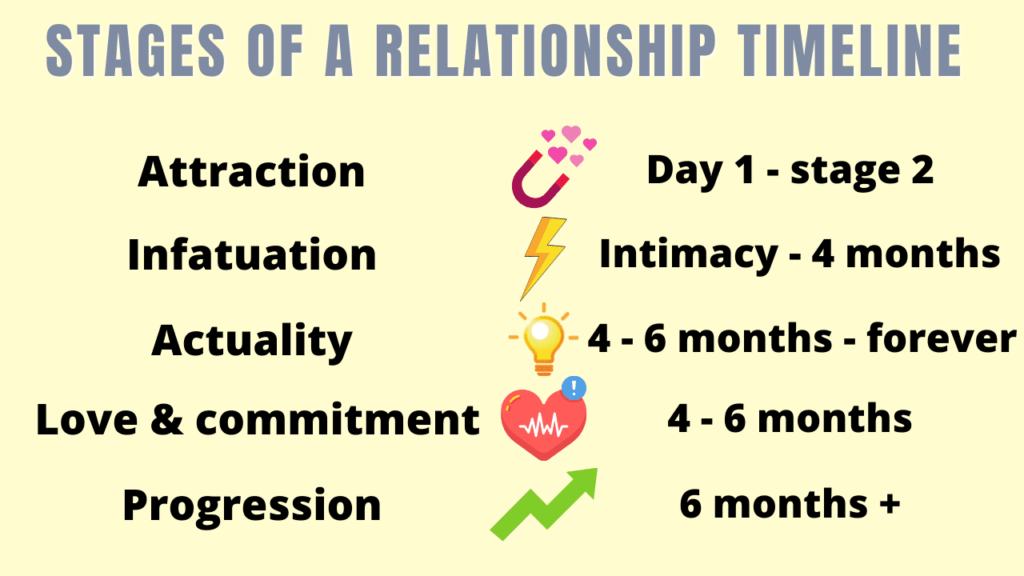

What’s your take on these 5 stages of a relationship? Which stage is your personal favorite? Let us know in the comments below.
However, if we’d left something out or if you’d like to discuss your relationship directly with us, get in touch with us here.

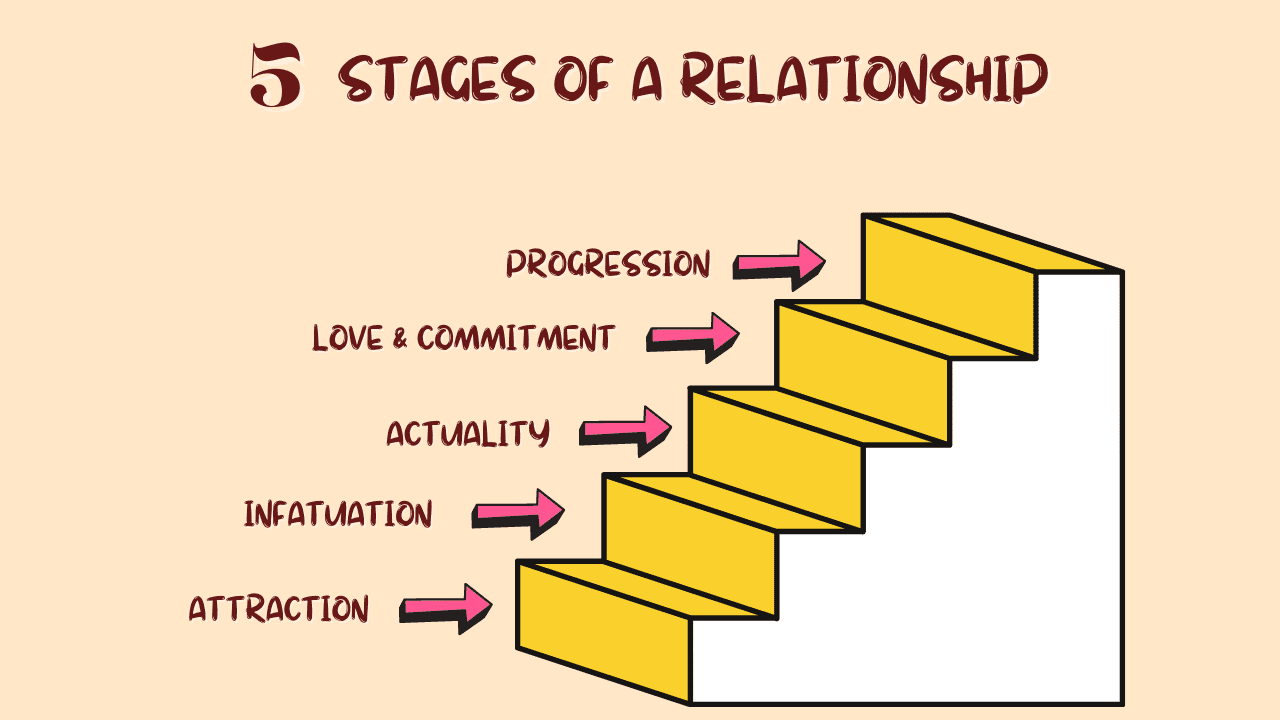
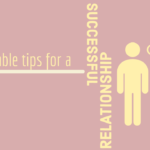



always learning from you with every single new article!! Keep going Zan 🙌🏻
I keep learning from you too, Linda.
Thanks for being here!
Zan